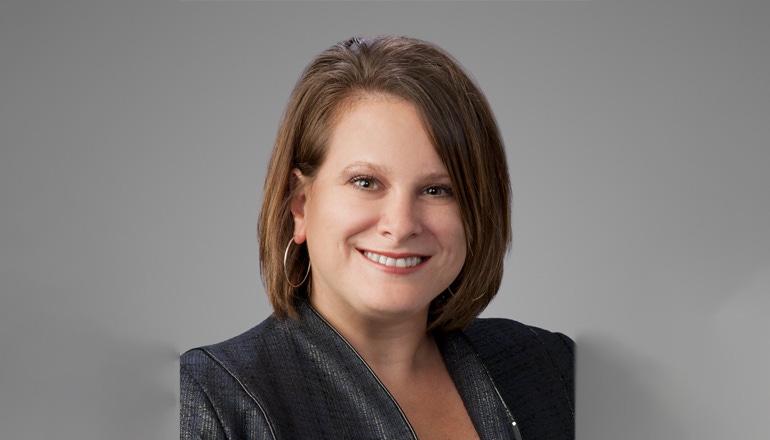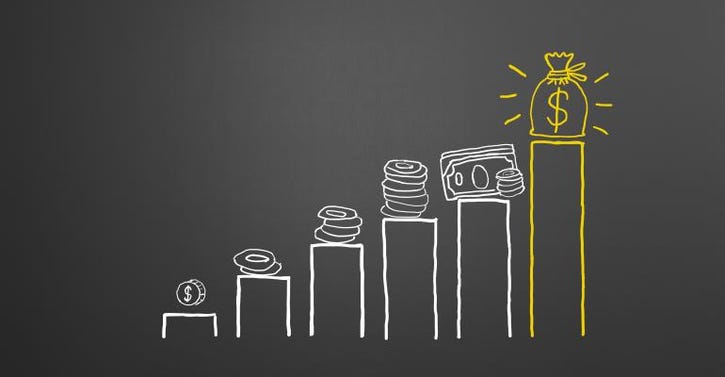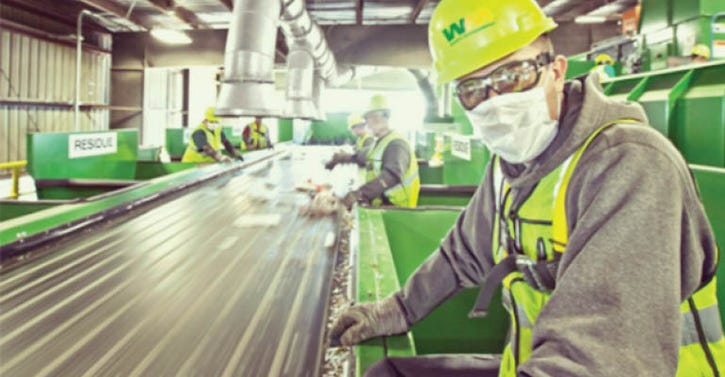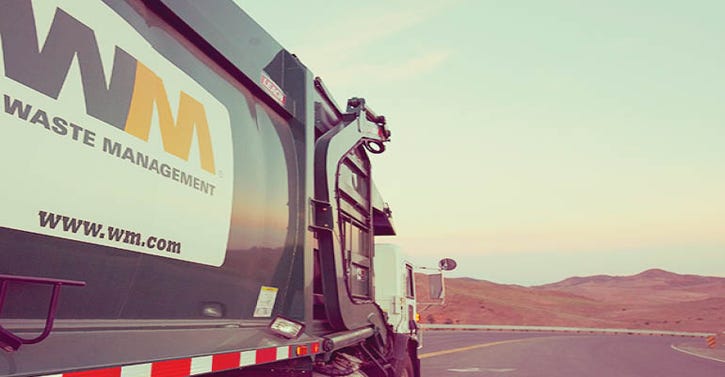More than 16 years ago, Rankin joined Waste Management as a relatively junior member of the company’s financial team. Now, she is the CFO of the largest waste services provider in North America.

At her roots, Devina A. Rankin, Waste Management’s senior vice president and chief financial officer (CFO), relishes in hard work and takes pride in a job well done. Her father and grandfather served in the Air Force, and that pride instilled in the men and women who serve this country is something Rankin has carried with her throughout her personal and professional life.
In 2002, Rankin joined Waste Management as a relatively junior member of the company’s financial team. Now, more than 16 years later, Rankin is the CFO of the largest waste solutions company in North America.
“I am extremely proud of the fact that I have earned this role,” says Rankin. “This is a great company, this is a great time to be here and I am very proud that for someone who joined the company as a senior financial analyst more than 16 years ago, my hard work, dedication and thoughtfulness have paid off and led me to a really fun and fulfilling role.”
“I am someone who leads with a heart,” she adds. “I am a people person, which is why I enjoy it so much. I get to engage with and interact with people on a very regular basis. I have the ability to contribute in a way where I see the people I am coaching and mentoring doing really great things and being recognized—there is really nothing else that compares.”
By the end of 2019, Rankin and her team will have saved the company more than $100 million from its bottom line. Rankin explains she saw an opportunity and worked across the organization to execute a plan to make a change. That plan led her all the way through to implementation.
“Actually being able to see the value created is definitely something I am proud of,” she says of the project.

As a finance person, it’s really no surprise that Rankin likes things she can measure. And over her last 16-plus years at Waste Management, she has thoroughly enjoyed telling the company’s story through its finances.
Prior to joining Waste Management, Rankin was a member of assurance practices of Ernst & Young and Arthur Andersen. She has a bachelor’s degree in business administration, a master’s degree in accounting from Texas A&M University and is a certified public accountant licensed in Texas.
“Accounting is the language of business,” she points out. “It really does give you an excellent foundation to talk about business performance. I think my education gave me what I needed to be a more well-rounded business professional.”

Additionally, Rankin was a professional auditor at Arthur Andersen during the USA Waste/Waste Management merger in 1999. She, along with many of her colleagues, was summoned to Houston to work on the post-integration accounting issues Waste Management was having at the time.
Rankin says she spent several months as part of that team, but based on where Waste Management was at the time, she didn’t imagine herself seeking out a career at the company. Frankly, she explains, operations were a bit chaotic then.
“The business was running—so trucks were running, waste was being picked up and disposed of appropriately—but the back-office part, where my career was really headed, was not the shining star of the organization,” she says. “I definitely think I could have looked at Waste Management as a place that was overwhelming, but instead, when I found myself looking for a place to go after Arthur Andersen fell apart, I knew it would present an interesting challenge and opportunity. That’s where I got my start. I came on board right after Arthur Andersen fell under in 2002, and I have now been here more than 16 years.”
Telling the Waste Management Story
When she joined Waste Management, Rankin was responsible for financial reporting—or, as she calls it, telling the company’s story to Wall Street and investors. That position, she explains, gave her a unique opportunity see the bigger picture of the company.
“I think that job did a lot to prepare me for the role I have today,” says Rankin. “I think the difference between that one and this one is that, for the most part, I was behind the scenes—writing that story, analyzing our results and helping to craft messages as part of the core financial reporting team in the earnings release processes. Now, being responsible for that at a different part of my career has really given me an appreciation for the different perspectives that every part of that team can bring to the table and how valuable they can be.”

In her role as CFO, Rankin is responsible for the company’s accounting functions, treasury functions, traditional investor relations and internal audit functions, among other duties. She says one of the best parts of her job is that each day is unique and undefined.
“I can play a different role within different parts of the organization,” explains Rankin. “We have more than 43,000 employees at Waste Management, and until my CFO role, my interaction with our employees outside of the core finance team was fairly limited. But what I enjoy so much about the CFO role is being able to expand my interaction with those 43,000-plus team members to be more comprehensive, because, ultimately, the job of the senior leaders is to communicate the Waste Management story to Wall Street and investors—it’s really all of our story.”
Rankin also enjoys sharing the stories of how the company is collectively driving continuous improvement.
“Being a part of that team that gets to engage with our employees proactively and then connect that to all of the things that we’re expected to accomplish for the shareholder and the other constituents of the organization is really a lot of fun,” she adds.
Sustainability in an Everchanging Industry
The waste and recycling industry today is constantly evolving with a lot of new innovations—and challenges. Since Rankin joined the industry, there are three trends she considers the most impactful and where she feels a great deal of progress has been made: making this a people-first industry, being great environmental stewards and thinking about how companies are using technology to change the way they serve their customers.
Rankin points out that though these are ongoing industrywide trends, there is still a lot of work to be done. She also expects the pace of change to continue to accelerate from where it is today.
“That said, one of the things that I think is fantastic about this industry is that in some ways, it hasn’t changed at all,” she explains. “When you think about Waste Management, ultimately, we provide an essential service to the communities that we all live in, and it really is phenomenal that most people don’t have to think about their waste services. It’s something they view as a dependable service week in and week out. It’s amazing to see the men and women, not just at Waste Management but in the industry as a whole, commit to, come rain or shine, getting out and ensuring our communities are clean and safe. That at its core, I think, is who we are as an industry. So, it’s exciting to know that we lead this passion about serving those communities but thinking about how we can do so in a way that puts people first and the employee first is the difference.”

And putting people and the employee first is more important than ever based on today’s constrained employment environment. That means that Waste Management and other industry players are having to think about how to be not just a great place to work but how they can be a better place to work tomorrow than they were today, stresses Rankin.
“It’s thinking about how we can differentiate ourselves not just with our customers but with our employees because they have options. We want to be sure we’re the option that they chose to make their career,” she explains. “As we think about what’s changing with millennials, as an example, there is a lot of talk about the gig economy and how things are changing with respect to how people approach work and wanting to be somewhere for a career. At Waste Management, we often celebrate people who hit really remarkable milestone anniversaries, and it’s not uncommon for us to celebrate someone who has worked for Waste Management for 40 or 50 years. We want to know what we can do to encourage future generations to think about Waste Management as a place to invest the next 30, 40 or 50 years of their careers as well.”
When it comes to environmental sustainability, Waste Management recently held its Phoenix Open golf tournament in Scottsdale, Ariz. This was the seventh year that the tournament—from start to finish—was a zero waste event.

In addition, Waste Management has committed to reducing fleet emissions by operating the largest fleet of heavy-duty natural gas trucks in North America. Nearly a third of those trucks run on renewable natural gas generated from landfill gas. The company also has invested in routing technology to improve fleet efficiencies and to reduce miles driven by 2 percent, which equates to approximately 8.9 million fewer miles a year since 2017.
And the company has vowed to continue its focus on working to keep recycling both environmentally and economically feasible. Waste Management invested more than $1 billion in processing infrastructure alone, including almost $22 million in 2017, up more than $13 million year-over-year. This resulted in 15.3 million tons of recycled goods in 2017, a 91.25 percent increase in recycling tons since 2007.
“At the end of the day, we’re the leading recycler in North America, and what we do each and every day to provide good outlets for recycled commodities is part of our DNA,” emphasizes Rankin. “I think what’s different from that regard from when I entered the business is that it’s no longer something any of us view as optional or supplemental to service. It’s something we all expect and require. I think that’s the right thing for all of us to think about as people who are involved in the industry, but also as people who are worried about protecting and preserving our planet. Recycling as a business is something that is really key to that big-picture objective. I think the industry takes that very seriously, and I think there has been an evolution there in the last 15 years.”

Rankin also expresses her excitement for diversity within in the industry as women continue to take on more and more leadership roles.
“It probably goes without saying that it’s really great to be a part of a senior leadership team at Waste Management that now has three women on it,” she says. “It really is quite remarkable, and I know we are not alone in making great progress in creating a more diverse workforce and more diverse leadership team.”
When it comes to staying motivated in her day-to-day work, Rankin says it boils down to one word: opportunity.
“I am not the kind of person who would enjoy being asked to lead an organization that is running perfectly,” she explains. “I really do think I excel when I have something to contribute. What I’ve really enjoyed about Waste Management is there are so many things that we do well, but I think there are things we can do better. It’s a place that’s just an opportunity-rich environment, and I am having fun continuing to be part of a team that executes upon those opportunities.”
Rankin is scheduled to speak on this year’s CFO Insights panel on Tuesday, May 7, at WasteExpo in Las Vegas.
“What I think is so great about the panel is that this industry is one that begins and ends with people,” says Rankin. “What I am so excited about is there is not going to be a stranger to me on the panel. I know each and every one of these people, and I consider them to be colleagues and friends. I think that is a unique dynamic of the waste industry.”
As we continue this series, we invite our readers to email Waste360 Editorial Director Mallory Szczepanski at [email protected] with suggestions of women to feature in the coming months.
About the Author(s)
You May Also Like




